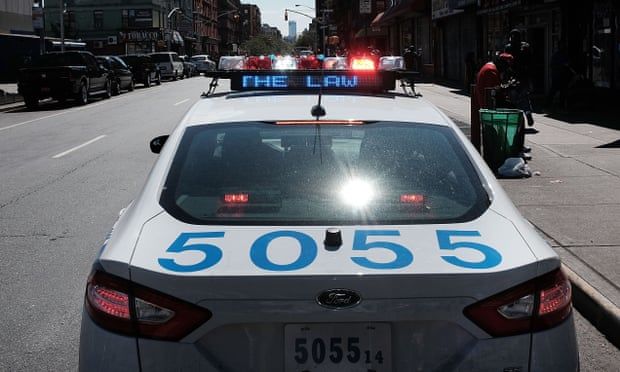
ADL leaders debated ending police delegations to Israel, memo reveals
Senior leaders of the Anti-Defamation League (ADL), the US-based non-profit organization known for combatting antisemitism and tracking extremism, debated whether to end a controversial program that connects American law enforcement officers with police leaders and members of the military in Israel, a 2020 internal document reveals.
The ADL, which works closely with US police on trainings related to bias and hate crimes, has for years run a program that sends delegations from US law enforcement departments to Israel to “study first-hand Israel’s tactics and strategies to combat terrorism”. The trips have long faced criticism from US civil rights groups, who argue that the trainings could encourage US police to further militarize their forces and exacerbate police violence.
A draft memo obtained by the Guardian and Jewish Currents shows that amid the George Floyd protests in 2020, two ADL executives questioned whether the trips could make American officers “more likely to use force” and contribute to the “problem” of police brutality. They considered advocating for the termination of the program.
“In light of the very real police brutality at the hands of militarized police forces in the US, we must ask ourselves difficult questions, like whether we are contributing to the problem,” wrote George Selim, an ADL senior vice-president, and Greg Ehrie, VP for law enforcement and analysis, on 9 June in the draft memo. “We must ask ourselves why it is necessary for American police, enforcing American laws, would need to [sic] meet with members of the Israeli military. We must ask ourselves if, upon returning home, those we train are more likely to use force. We hope that that is not accurate.”
Since 2004, the ADL has taken 500 to 600 police officers and partners to Israel for “educational and training purposes”, the document said. The VPs said the trips had “built bonds” among police but were “of questionable programmatic value”. They said the program could lead to “lost donor revenue” and could cost the ADL upward of $200,000 a year in staff time, including resources to “defend the trips from controversy”. The draft memo further said it was unclear whether the trainings helped encourage police combat antisemitism.
The draft document said termination of the program was the “best approach” since it would “eliminate a program with limited impact and high controversy”.
 An ADL official whose memo had expressed concern said his final recommendation was to continue the police delegation program.
An ADL official whose memo had expressed concern said his final recommendation was to continue the police delegation program.
Asked about the document this week, Selim said the memo was an “early draft” written before the ADL had made a final assessment.
Selim said he and Ehrie had conducted a “thorough assessment of the program” after writing the draft memo, and that their final recommendation was “to continue the program with updated curriculum and content in order to increase the value and impact of this type of law enforcement engagement”. The draft was addressed to the ADL CEO, Jonathan Greenblatt, but Selim declined to say whether the CEO had received it or how widely it was circulated.
Selim added that the trips were “paused” due to the pandemic but suggested they could restart: “We remain committed to law enforcement engagement and professional development nationally and internationally and are likely to expand our educational law enforcement programs.”
George Floyd’s murder had prompted the ADL to “ask ourselves tough and probing questions”, Selim said, adding that his review had concluded that the criticisms of the exchange were false: “ADL is proud of its decades of work with law enforcement and believes strongly that those relationships are crucial in helping protect all people from hate crimes and hate-motivated violence. As we said in the memo, the Law Enforcement Leadership Seminars have led to stronger relationships with law enforcement that have directly helped ADL with the investigation of hate crimes and protecting local communities.”
Selim also said the trips were “educational and cultural in nature” – featuring briefings, site visits and meetings with Israeli and Palestinian law enforcement leaders – and that they did not involve “tactical trainings” or teachings about interrogation methods.
Activists have protested against the ADL’s Israel trips through a campaign called Deadly Exchange. In 2020, a coalition of activist groups – including the Movement for Black Lives, Jewish Voice for Peace, and the Arab Resource and Organizing Center – also launched a “Drop the ADL” campaign, citing its ties to law enforcement.
The ADL, which works closely with US police on trainings related to bias and hate crimes, has repeatedly dismissed the protests, arguing the activists misrepresent the program.
Bill Ayub, sheriff of Ventura county in California, who went to Israel for an ADL training in 2017, said he had been impressed by the “Hollywood-esque” surveillance systems of Israeli law enforcement, which he said were more invasive than those used by US law enforcement but “allowed them to have a really good handle on problems brewing and to track known dissidents or known criminals”.
“The Israelis are very innovative, out of necessity, with technology and measures for providing security and detecting threatening behavior and criminal behavior,” he said.
Ayub also said he had been shocked to learn how Israeli officers used force during arrests: “We’d be in jail if we did something like that here,” he said.
Stefanie Fox, executive director of Jewish Voice for Peace, an organization that advocates for Palestinian rights, said that the memo showed how public pressure had forced the ADL to “finally admit the contradiction between their long support for law enforcement and their public claim of working for civil rights”, but that she was disappointed the organization seemed to be doubling down on the program: “This should be a dividing line for progressives.”











